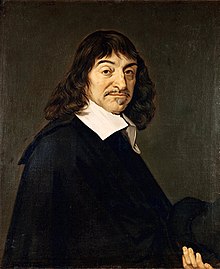AustLit
-
Editor's note: This digital portfolio was completed by Codie Condos Distratis for PHIL2013 and published by Cirrus as an example of superlative student work.
Return to Best of Cirrus Special Collection: PHIL2013
-
This work is a synoptic account of 17th century philosopher, René Descartes (Figure 1), comprising a critical evaluation of his thought. I begin by mapping out his epistemological claims, to then show how this informs his metaphysics and arguments on automata. My analysis will reference responses from his critics, secondary material, and incorporate contemporary examples I create and find, to generate my own critique of his philosophical worldview.
-
René Descartes is commonly pinned as the philosopher who initiated the philosophical agenda for the first half of the 17th century. Some suggest that Descartes’s notion of the human subject reinforced the mind-body separation introduced by Plato, and significantly shaped the trajectory of modern, western thought thereafter (Rozemond, 2008, p. 372). This claim is attributed to his cogito, “I think, therefore I am,” formed in light of Descartes’s opposition to the predominant Scholastic-Aristotelian conception of the body in the medieval period (Nolan, 2015, p. xlv; Pasnau, 2014; p. 635). Descartes proposed a mechanistic account, “reducing [physical objects] to spatial extension alone (length, breadth, and depth)” (Nolan, 2015, p. li). His mechanism – and theory of mind – subsequently influenced the sciences, and was responded to by a series of his contemporaries. We will see, for instance, that Spinoza contests the mind-body dualism, developing a theory of monism, and Princess Elisabeth of Bohemia arguably raises the most important question: how do two separate and distinct substances interact? These positions offer a mere sampling of how he is situated in his philosophical context, however. Descartes’s worldview was not generated in a vacuum; to obtain a well-rounded perspective, it is thus essential to critically address his arguments, their objections, and how this produces differing views.
You might be interested in...





